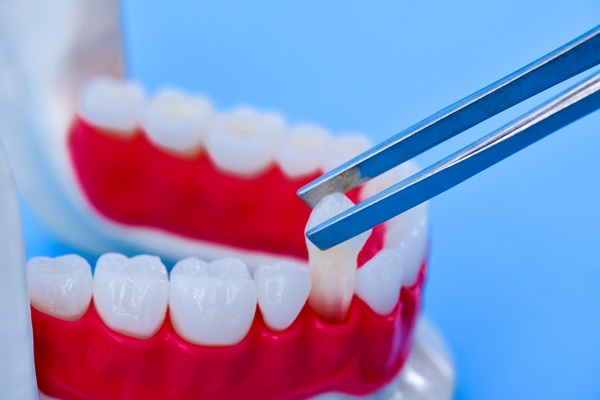A Oral Surgeon Discusses the Dental Implant Surgery Procedure

Dental implants are now the go-to supports for crowns, bridges, and dentures. They make it possible for you to enjoy fixed and permanent replacements for missing teeth. If you are thinking about rebuilding your smile, learning about dental implant surgery is a good place to start.
Reasons to choose dental implants for missing teeth
Dental implants do more than just anchor prosthetics and dental restorations. They also maintain the mass and density of the section of bone that they sit in. The presence of dental implants in the jaw stimulates the regeneration of bone tissue. The result is a solid jaw that holds remaining natural teeth firmly in place. An adequate amount of bone mass also maintains the structure of the lower face. In contrast, loss of bone mass in the jaw results in a sunken look about the mouth.
Here is what the patient should expect from the dental implant procedure.
1. Anesthesia
The type of anesthetic a patient receives depends on their specific needs. A local anesthetic will work for the patient who needs a single dental implant, with no additional surgical steps. A patient that needs a large bone graft or several dental implants may need IV sedation or general anesthesia.
2. Preparatory procedures
Some candidates for dental implants may need a bone graft to create a more solid base for their dental implants. Some may need the removal of failing teeth to make space for dental implants. Others may need nerve repositioning to create space for the implant. Others still may require a sinus lift to make room for an implant in the upper jaw.
An oral surgeon can combine these procedures with dental implant surgery. They may also recommend that their patient undergo implant installation in a separate procedure.
3. Dental implant installation
Here is the step-by-step process of dental implant surgery. When an oral surgeon combines dental implant surgery with one or more of the procedures mentioned in the previous section, they will skip the first step:
- The oral surgeon makes a small opening in the gums to expose the target section of the jawbone
- They drill a small hole into the jaw. This hole becomes the nook in which the dental implant sits
- Next, the oral surgeon places the dental implant, which is a hollow, screw-like rod with threads on its inner surface
- With the implant in place, the oral surgeon screws in the abutment, a screw-like connector with threads that match those on the inside of the dental implant
- The oral surgeon then closes the gums around the abutment, leaving the upper end above the gumline
Sometimes the dentist will recommend a separate procedure for the placement of the abutment.
4. Loading the implant(s)
This is the least invasive part of the process, where a dentist attaches a dental restoration or prosthetic onto the abutment. The dentist may choose to combine this step with one or more of the steps detailed in previous sections.
Once the artificial tooth is fitting to the patient’s satisfaction, the person goes home with a permanent replacement for their missing tooth or teeth.
Time to part ways with the gaps in your smile
Start by booking an appointment with our dentist. They will be happy to work with you and find a tooth replacement option that meets your needs. Find out whether dental implants are that option for you.
Request an appointment here: https://spectrumsurgical.net or call Facial Spectrum at (816) 524-4334 for an appointment in our Lee's Summit office.
Check out what others are saying about our dental services on Yelp: Dental Implants in Lee's Summit, MO.
Recent Posts
A dental implant is considered the gold standard of dental restorations. Titanium rods act as dental roots that stimulate the jawbone. The artificial crowns replace the missing ones above the gumline. These restorations are what you need to have stable, natural-looking teeth again. Here are the details about the role of a dental implant in…
A dental implant is considered the gold standard of dental restorations. Titanium rods act as dental roots that stimulate the jawbone. The artificial crowns replace the missing ones above the gumline. These restorations are what you need to have stable, natural-looking teeth again. Here are the details about the role of a dental implant in…
A regular dentist can refer you to an oral surgeon if you need more dental care. This type of surgeon can perform procedures that can improve the face, mouth, or neck. Understanding the reasons for a referral to this provider can help you prepare for your procedure. Here are the reasons your dentist will refer…
A sinus lift or sinus augmentation can build up your upper jaw. This procedure is invasive. The dentist will take healthy bone and place it in the section of the maxilla that needs it. Here are the sinus lift benefits that you must consider.Studies show that a thinning upper jawbone can result in the weakening…

